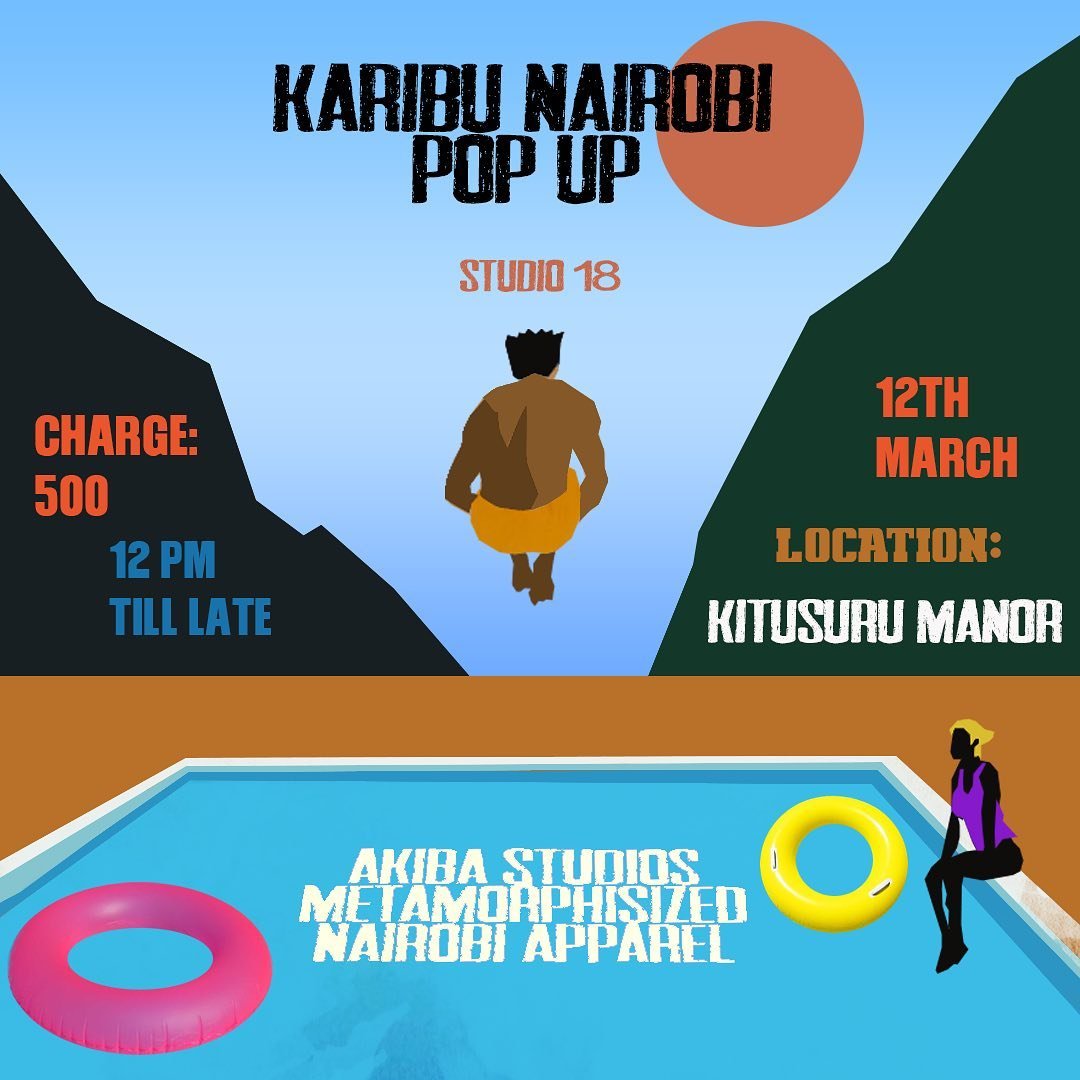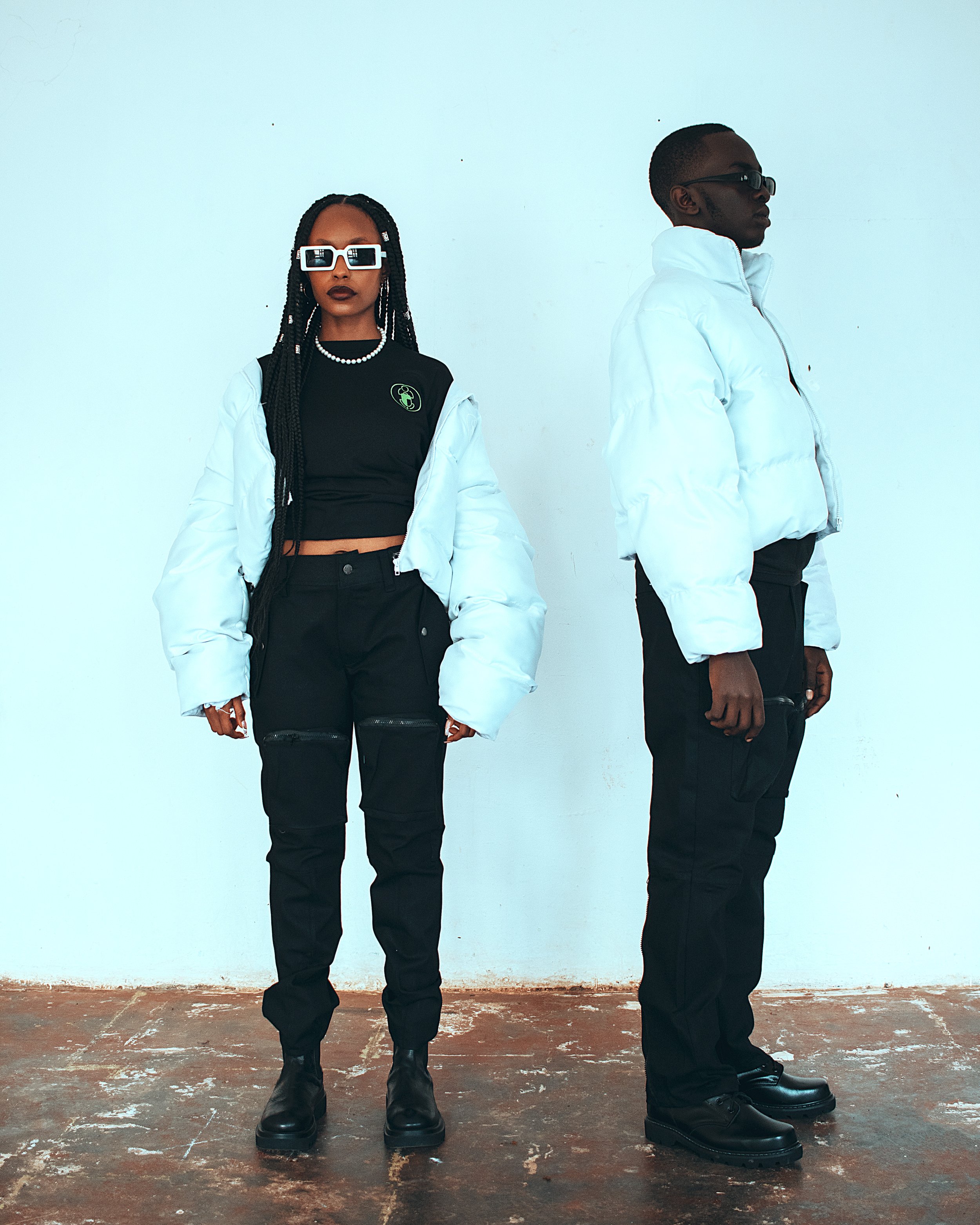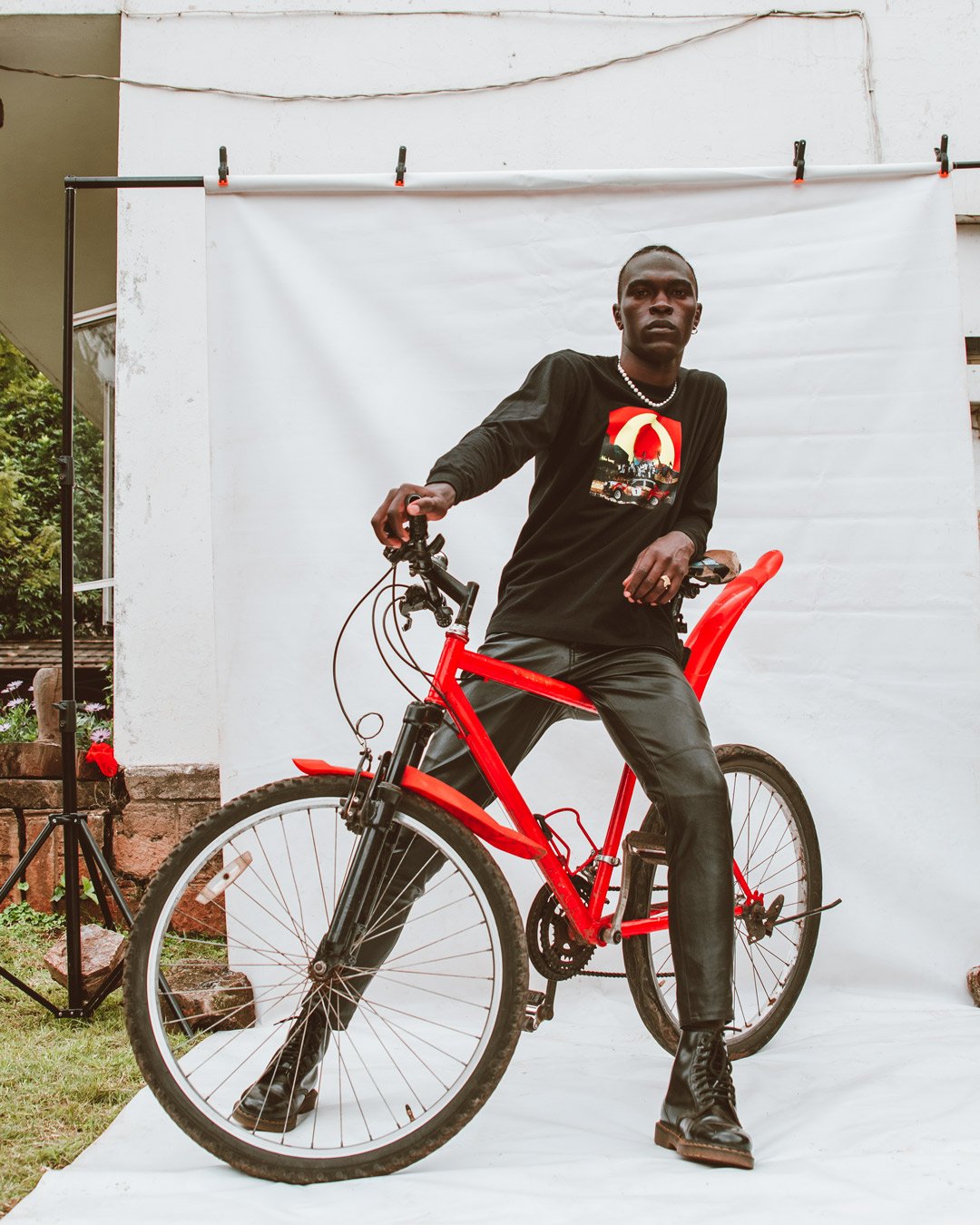Karibu Nairobi Pop Up: A Revolution In Fashion
Over the years, Nairobi city has become increasingly fashion forward. Ranging from Y2K aesthetics to 90’s flavour, modernised traditional attire and contemporary staples, the style around town is heightened with experimentation.
Some of the individuals who are at the forefront of this mission are Studio 18 KE, a fashion collective consisting of Akiba by Akiba Haiozi, Metamorphisized by Daudi. O and Nairobi Apparel District by Junior Orina, who aim to change the narrative on Kenyan street wear.
The mavericks created their street wear design hub at their old studio in the Nairobi CBD and had their first two pop ups just before the COVID 19 pandemic hit Kenya. However, after much restructuring , they found a new home in Kilimani at the Kuona Artists Collective where they officially established STUDIO 18 KE in March 2021. They held their first fashion pop up the following month under their new name and have been consistent ever since.
Poster from previous Studio 18 Karibu Nairobi pop up
My curiosity on their journey and success thus far led me to their studio on a foggy Thursday afternoon, determined to know more about the Kenyan fashion industry, their challenges and their dreams.
What does fashion and streetwear mean to you?
All: To us it’s simply a way of expressing yourself. In Kenya, street wear is the predominant style of choice. Culturally, it’s how Nairobi natives dress. If you walk around town you can see it.
You’ve been very consistent with your monthly pop ups, while still being able to produce fresh ideas with your designs. Do you plan your drops together or around your pop ups?
Akiba: Not exactly. We do plan them together and around the events, but we don’t always drop new designs at the same time. Each brand has it’s own creative director so it’s really up to their vision.
Daudi: Besides sales and creating foot traffic, one of the main goals of the pop up was to maintain consistency with all the brands. So every month we needed to have fresh ideas, even if it was a few alterations on restocks like new colourways etc.
METAMORPHISIZED KIPEPEO COLLECTION
Photo’s by @kuya.bi
How does it feel seeing Nairobi wearing your clothes and also consistently showing for your events?
All: It feels amazing, it feels good!
Akiba: We’ve always been experimental, so having people come in and consume our stuff is dope. We want to show Kenyans that they can rock quality Kenyan street wear. Chasing name brands has always been the norm, chasing a certain look and we want to curb that.
Orina: We want to direct people into wearing and appreciating real Kenyan designer brands, local brands, made by us and for us. We want people to be proud to say that they are wearing quality designer street wear.
Daudi: The fact that the younger guys who can’t afford our pieces just yet have told us that they’re saving to buy our designs creates a lot of joy in me. It makes the work we put in meaningful. To know that we are part of their journey in finding their style is amazing. I think we also caught our audience at the right time, it was ripe. We’ve learnt that working alone isn’t easy, and having supporters is a big part of that process.
The fashion space has really evolved since 2015. What do you think has triggered those changes over the years?
Akiba: I think there’s now a lot of opportunities for designers, for concept creators and content creators. It’ s a nice space right now I think. For manufactures as well. There’s also more room for experimentation as designers and consumers of fashion.
Orina: More people are receptive to local brands, there’s less prejudice against us and hopefully that will continue in the long run. I think what has triggered this movement is technology though. More people have been exposed to the idea that they can make a livelihood out of fashion through media. Even though we’re not there yet, we’re definitely getting there.
Daudi: People are more confident experimenting with their style and daring to go beyond trends. Like it’s not crazy seeing a guy walking around town with blue hair, polished nails and jewellery. I think generational differences, especially with Gen Z’s, have definitely triggered this shift - they do, say and wear what they want. Me being in-between the two generations I get to see the shift firsthand and I’m glad they are supporting us.
Nairobi Apparel District, Collection 2021
Why do you think it’s important to showcase fashion beyond just the garments?
Daudi: Fashion is an experience and everyone wakes up in the morning to dress themselves. Therefore, whether fashionable or not, everyone relates to fashion in their own personal sense. So having pop ups where fashion interacts with music and other creatives just sharing ideas and collaborating, it definitely opens doors and different perspectives. It kind of creates a family tree where all of us connect.
Orina: Diversity for one. Nowadays you can’t just be tied down to one art form and the experimenting bit makes it more interesting because you're stepping out of your cocoon and discovering a lot more about yourself or an artist that you like. It opens up the idea for collaboration and that’s how the world is working right now.
Akiba: We mainly wanted to build a community where people can come and experience the garments, interact with other creatives and just see our space. Being at Kuona and being surrounded by all these other artists who weld, sculpt and paint, we also get to learn a lot.
What inspires your creativity and designs?
Akiba: I’m more so inspired by a lot of conversations and observations as well. How people are walking, how people are dressing and how they communicate.
Orina: My own personal experiences are at the top of that list. Second of all I can say women, those who’ve been in and out of my life. Architecture is also a big one for me. I have a deep appreciation for lines and curves.
Daudi: Furniture and interior design for me. Also, a lot of music and walking through galleries. There’s an artist in Kuona who inspires me too. His name is Dennis Muraguri. The colour schemes and storytelling in his art pieces have in a way inspired some of my collections.
How would you describe the energy felt at your pop-ups?
Daudi: Can I say positive energy? Always really good vibes. When I walk around, I hear people say that they feel open and safe in our space because there’ll be no judgement on their fashion choices.
Akiba: I think the people who come for our pop ups are very eclectic. They bring that ‘out of the box’ energy.
Orina: There’s a lot of energy. When I observe the crowd I notice the intimacy and therapeutic feeling it creates for them. You never know what people are going through, but I’m glad they can let their hair down in our space.
You’re about to celebrate your one year anniversary next month, which is exciting. Looking back, can you point out some notable goals you set out to achieve?
Orina: Yes, we definitely can. We appreciate where we’re at now but for our overall goals, we are still progressing.
Daudi: They have in a way, but we still have bigger goals. Gathering over 500 people is not easy, so we’re focused on building the culture how we can. I realised that in as much as we have our consistent audience, the newer troupes are always from a different crowd and I find that fascinating - to attract and interact with all sorts of fashion enthusiasts like that. Some who even travel to Nairobi to experience this with us.
Nairobi Apparel District Tote Bags
What do you think is your unifying factor as a collective?
Orina: I think it’s because we’re young black African men who share an understanding and needs to be met. We share the same goals, mindset and vision for ourselves.
Akiba: The vision is to inspire people and show them that they can do it too.
Daudi: Beyond all that. I think our friendship and brotherhood unifies us and makes us who we are.
Orina: Also, we really want to combat fast fashion and trends!
Let’s get into that. What are your thoughts on fast fashion?
Orina: It’s so crazy. For one, people will go to Moi Avenue to buy expensive knockoffs, but yet we have local brands creating employment opportunities for those in the industry, but they still don’t want to support it.
There’s also so much waste because of short-lived trends. We try limit our collections to 2 or 3 a year so that we can slow down production and make it a bit more sustainable and when exhausted, even up-cycle and recycle our fabrics. We have guys in Kenya trying out fish leather, banana leather and other more sustainable materials like linen as opposed to pure cotton which helps.
Akiba: Yeah, some people have the right priorities and others don’t. So we try to do our part where and when we can.
And what about genderless clothing?
Akiba: I think we're really on it as a collective because most of our stuff is unisex. But in as much as we are creating unisex clothes we also want to design clothes for different types of people, like the Akiba tank tops and maybe some dresses. We're trying to categorise our products in a way that works for a lot of people so that we can also be very diverse.
Daudi: When I’m designing I unintentionally create silhouettes that work with any gender and it works. But interestingly enough, I’ve found that women are a larger market for my brand.
In your time within the fashion industry, what structures have stood out to you whether challenging or uplifting?
Akiba: There’s definitely a gap between the high end and street wear/small designers. I think big brands have more access to opportunities and there are definitely gate keepers within the industry - some stylists only chose to work with some brands etc. but luckily for us, no one can stop us. We’re everywhere - we create from an organic space, where we’re building community and inspiring each other.
Orina: I wish the bigger brands passed down knowledge to upcoming designers through workshops and such or just gave back to the fashion community in some way, but most of them don’t do that. They just sell to their expensive clientele, alienate the common mwananchi and keep it moving. There’s a lot to learn in this industry, but there’s no sharing of knowledge. It’s too tight knit.
Daudi: There are very few fashion schools in Kenya, thus very few successful fashion brands, especially street wear. Hopefully we’ll be those brands. The government hasn’t put up systems that make it easier for one to navigate the fashion industry on any level. Consumer behaviour of local street wear also hasn’t been easy. Streetwear (outside of thrifting) wasn’t taken seriously as a clothing style until recently. Streetwear can be luxurious if you want it to be. So you kind of have to figure it all out on your own and build value.
Thankfully, we’ve had mentors like Musa of Bongosawa who showed us some ropes. However, at the end of the day, our brand visions are still different. There are some answers I had to figure out on my own based off my other ideas, and that’s why we started Studio 18. Our goal is to create a system that makes it easier to share information with anyone interested. Hopefully by the end of the year, we will have our own bigger production space that will simplify people’s ideas with the solutions that we have.
What do you think the future of the fashion industry in Kenya is?
Orina: I think the future for us is definitely sustainable. It’s going to be big and it’s going to be expensive.
Daudi: We also hope to expand to different markets outside of Nairobi. Hopefully with people like us, our industry will explore new ideas, push boundaries and challenge for originality instead of just making clothes to sell, allowing locals to also experiment with their own style.
Akiba: I think we’re going to create structures that work for us. We can’t wait for others to adjust what works for them. Fashion films are definitely part of our culture now going forward too. Creators like Urban Pitchaz and 199x are at the forefront of this right now. We also need to tap into preventing gentrification of our culture by western brands, but at the same time I also think it (unfortunately) takes that same gentrification for people to appreciate local culture.
Akiba Studios, Safari Rally Collection
Photos by @yobbiemkenya
Should we patent more moving forward?
Orina: That’s a tricky one because to patent something, it really has to be an original idea and what’s really original? Then there’s an expiry period for the patent itself, which is also expensive and ideally, you should patent locally and internationally. Just look at the case of Supreme and Supreme Italia - it’s unstoppable.
Akiba: When we build a like minded community we can chat shit and use the power of the media to call out culture appropriators against using our culture for mere profit. I’ve seen it happen in the UK and it works. We just have to be vigilant.
Orina: Let’s also get into using NDA’s to protect our ideas. They work.
Lastly, what gems do you want to share with upcoming designers and fashion enthusiasts?
All: Consistency!
Akiba: Don’t stop experimenting, find your niche, create campaigns and content for your brand. Always look for inspiration amongst each other and all around you.
Orina: Just keep going. Don’t give up. It won’t be easy, but with consistency something will happen.
Daudi: Come to Studio 18 and get inspired.
Who hasn’t been to Studio 18 is the real question here. Many of your favourite celebrities i.e Burna Boy, Nasty C, Karun, Xenia Manasseh and Bensoul have been dressed by the self taught designers. They have also been sought out by Fashion Scout for their Creative DNA 2.0 programme by the British Council that aims to empower 20 Kenyan fashion and accessory designers. How can you not stan? Their one year anniversary is coming this May and it’s going to be a very special one, so don’t miss out! Kenya to the world.












